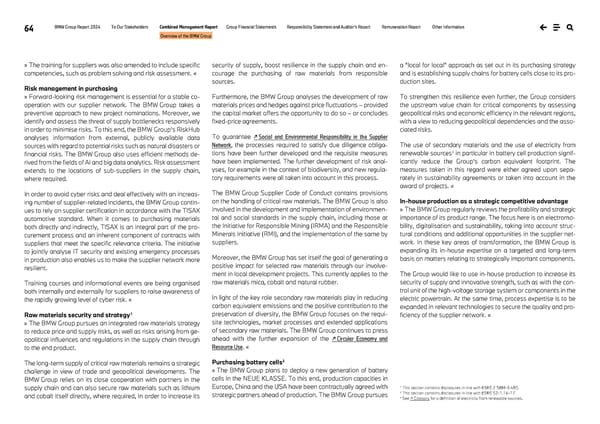64 BMW Group Report 2024 To Our Stakeholders Combined Management Report Group Financial Statements Responsibility Statement and Auditor’s Report Remuneration Report Other Information Overview of the BMW Group » The training for suppliers was also amended to include specific competencies, such as problem solving and risk assessment. « Risk management in purchasing » Forward-looking risk management is essential for a stable co- operation with our supplier network. The BMW Group takes a preventive approach to new project nominations. Moreover, we identify and assess the threat of supply bottlenecks responsively in order to minimise risks. To this end, the BMW Group’s RiskHub analyses information from external, publicly available data sources with regard to potential risks such as natural disasters or financial risks. The BMW Group also uses efficient methods de- rived from the fields of AI and big data analytics. Risk assessment extends to the locations of sub-suppliers in the supply chain, where required. In order to avoid cyber risks and deal effectively with an increas- ing number of supplier-related incidents, the BMW Group contin- ues to rely on supplier certification in accordance with the TISAX automotive standard. When it comes to purchasing materials both directly and indirectly, TISAX is an integral part of the pro- curement process and an inherent component of contracts with suppliers that meet the specific relevance criteria. The initiative to jointly analyse IT security and existing emergency processes in production also enables us to make the supplier network more resilient. Training courses and informational events are being organised both internally and externally for suppliers to raise awareness of the rapidly growing level of cyber risk. « Raw materials security and strategy1 » The BMW Group pursues an integrated raw materials strategy to reduce price and supply risks, as well as risks arising from ge- opolitical influences and regulations in the supply chain through to the end product. The long-term supply of critical raw materials remains a strategic challenge in view of trade and geopolitical developments. The BMW Group relies on its close cooperation with partners in the supply chain and can also secure raw materials such as lithium and cobalt itself directly, where required, in order to increase its security of supply, boost resilience in the supply chain and en- courage the purchasing of raw materials from responsible sources. Furthermore, the BMW Group analyses the development of raw materials prices and hedges against price fluctuations – provided the capital market offers the opportunity to do so – or concludes fixed-price agreements. To guarantee ↗ Social and Environmental Responsibility in the Supplier Network, the processes required to satisfy due diligence obliga- tions have been further developed and the requisite measures have been implemented. The further development of risk anal- yses, for example in the context of biodiversity, and new regula- tory requirements were all taken into account in this process. The BMW Group Supplier Code of Conduct contains provisions on the handling of critical raw materials. The BMW Group is also involved in the development and implementation of environmen- tal and social standards in the supply chain, including those at the Initiative for Responsible Mining (IRMA) and the Responsible Minerals Initiative (RMI), and the implementation of the same by suppliers. Moreover, the BMW Group has set itself the goal of generating a positive impact for selected raw materials through our involve- ment in local development projects. This currently applies to the raw materials mica, cobalt and natural rubber. In light of the key role secondary raw materials play in reducing carbon equivalent emissions and the positive contribution to the preservation of diversity, the BMW Group focuses on the requi- site technologies, market processes and extended applications of secondary raw materials. The BMW Group continues to press ahead with the further expansion of the ↗ Circular Economy and Resource Use. « Purchasing battery cells2 » The BMW Group plans to deploy a new generation of battery cells in the NEUE KLASSE. To this end, production capacities in Europe, China and the USA have been contractually agreed with strategic partners ahead of production. The BMW Group pursues a “local for local” approach as set out in its purchasing strategy and is establishing supply chains for battery cells close to its pro- duction sites. To strengthen this resilience even further, the Group considers the upstream value chain for critical components by assessing geopolitical risks and economic efficiency in the relevant regions, with a view to reducing geopolitical dependencies and the asso- ciated risks. The use of secondary materials and the use of electricity from renewable sources3 in particular in battery cell production signif- icantly reduce the Group’s carbon equivalent footprint. The measures taken in this regard were either agreed upon sepa- rately in sustainability agreements or taken into account in the award of projects. « In-house production as a strategic competitive advantage » The BMW Group regularly reviews the profitability and strategic importance of its product range. The focus here is on electromo- bility, digitalisation and sustainability, taking into account struc- tural conditions and additional opportunities in the supplier net- work. In these key areas of transformation, the BMW Group is expanding its in-house expertise on a targeted and long-term basis on matters relating to strategically important components. The Group would like to use in-house production to increase its security of supply and innovative strength, such as with the con- trol unit of the high-voltage storage system or components in the electric powertrain. At the same time, process expertise is to be expanded in relevant technologies to secure the quality and pro- ficiency of the supplier network. « 1 This section contains disclosures in line with ESRS 2 SBM-3.48f). 2 This section contains disclosures in line with ESRS S2-1.16-17. 3 See ↗ Glossary for a definition of electricity from renewable sources.
 BMW Group Report 2024 Page 63 Page 65
BMW Group Report 2024 Page 63 Page 65